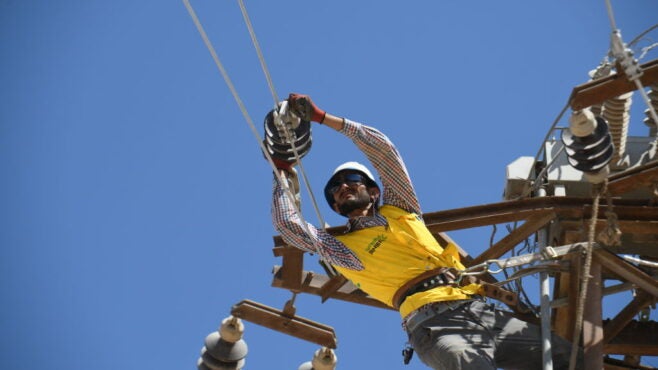For most countries, deploying renewable energies is the overwhelming priority to mitigate climate change. Relatively few prioritise grid development, although this will be essential to absorb increasing amounts of wind and solar power.
These findings are based on a synthesis report of national climate action plans – so-called nationally determined contributions (NDCs) to the Paris Agreement – prepared by the Secretariat of the UN’s Framework Convention on Climate Change a month ahead of COP26 in Glasgow, UK. The report covers the 164 latest available submissions, including 86 NDCs updated by the end of July 2021. The commitments cover 93% of global greenhouse gas emissions.

Discover B2B Marketing That Performs
Combine business intelligence and editorial excellence to reach engaged professionals across 36 leading media platforms.
More than 80% of countries are planning to deploy renewable energies in their attempt to comply with the Paris Agreement, shows Energy Monitor’s Weekly Data. Yet only 24% refer to grid improvements in their NDCs. In addition, while the electric vehicle revolution is accelerating in countries like Germany, only 28% of countries mention the electrification of transport as a mitigation measure.

The ‘energy efficiency first’ principle similarly appears to be lacking, with energy efficiency improvements getting nearly half the mentions of renewables. Overall, efforts will need to be increased to get on track to net zero. The current NDCs will cut global emissions by 12% in 2030 compared with 2010 levels; the decease needs to be 45% for climate neutrality by 2050.
[Keep up with Energy Monitor: Subscribe to our weekly newsletter]

US Tariffs are shifting - will you react or anticipate?
Don’t let policy changes catch you off guard. Stay proactive with real-time data and expert analysis.
By GlobalDataDeploying more renewables at speed and scale depends on an adequate grid. The centrality of grids to the energy transition needs greater recognition – in the last six years investments in electricity networks have stagnated across the globe.
To keep pace with the growing share of renewables, grids require a more integrated approach to planning, supportive policy frameworks and innovation to get energy from generation to end users. As vice-president of SOO Green HVDC Link Steve Frenkel said in conversation with Energy Monitor in July: “If you want more renewables, you need more transmission.”
This article is part of a special series GlobalData Media is publishing in the run-up to COP26, which takes place in Glasgow from 1-12 November 2021. Our focus is on the opportunities and challenges for business of the transition to clean energy and net-zero greenhouse gas emissions. Other articles in this series include:
- Why success at COP26 is vital for business – Energy Monitor
- Carbon markets see promise and peril from COP26 – Energy Monitor
- Is FDI making the climate crisis worse? – Investment Monitor
- Companies need to up their climate game. Can FDI help them? – Investment Monitor
- Business professionals see greenwashing as a major issue, but genuine net-zero action doesn’t have to mean red ink – Verdict
- COP26: the three ways a decarbonising business can leave oil and gas – Offshore Technology
- How scope 3 emissions pose the biggest threat to net-zero ambitions – Mining Technology
- Food giants need to pick up pace on greenhouse gas emissions – Just Food
- COP26 – climate change and the automotive sector (1) –Just Auto
- How hospitals and the medtech sector are tackling the climate crisis – Medical Device Network
- What drinks brand owners should know about COP26 – sustainability spotlight – Just Drinks
- COP26 panel – how is apparel tackling climate change? – Just Style
- Inside Cervest’s plan to map the world’s climate risk – Verdict





